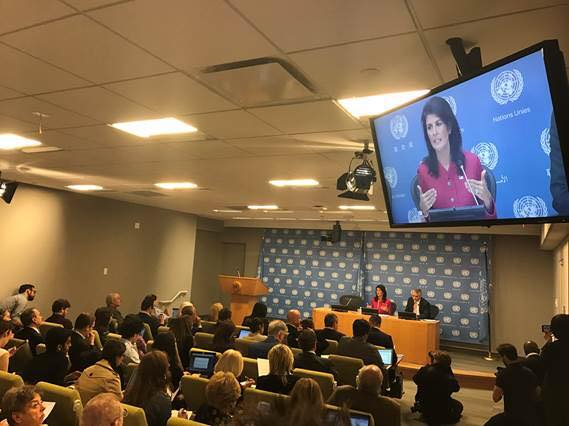News
US and Russia clash over US attempt to debate rights at UN

(Photo: Nikki Haley/ Facebook)” width=”569″ height=”426″ /> The council approved April’s agenda without including that debate. But it can still be added if at least nine of the 15 council members vote for it and U.S. Ambassador Nikki Haley told reporters later that the United States “fully expects” to hold the debate on April 18. (Photo: Nikki Haley/ Facebook)
The United States and Russia clashed Monday over a U.S. attempt to have the Security Council debate human rights violations as a major cause of conflict for the first time during this month’s American presidency of the U.N.’s most powerful body.
The council approved April’s agenda without including that debate. But it can still be added if at least nine of the 15 council members vote for it and U.S. Ambassador Nikki Haley told reporters later that the United States “fully expects” to hold the debate on April 18.
“If you look at the conflicts we have in the world, they always go back to the human rights issues on the ground within those countries,” Haley said.
She cited student protests against Syrian President Bashar Assad that sparked the more than six-year war and the self-immolation of a Tunisian fruit vendor who was harassed by police and not able to work that sparked nationwide demonstrations as examples.
The Security Council’s mandate is to ensure international peace and security, Haley said, so “it is incumbent” on members to look at how human rights are related to conflict.
Haley stressed that the debate “is not intended to in any way call out certain countries or blast them or use this as a ‘gotcha’ game.”
The aim, she said, is to look at human rights issues that lead to conflict and extremism to try to prevent another Syria or Tunisia.
Russia’s deputy U.N. ambassador Petr Iliichev took issue with the premise of the proposed debate saying “a general statement that international peace and security are threatened by human rights violations is not true.”
He also argued that other U.N. bodies including the General Assembly and the Geneva-based Human Rights Council already deal with human rights.
“Why are we taking everything to the Security Council?,” he asked. “Then those bodies should be dismantled.”
But Iliichev said Russia will consult with the U.S. on trying to find “a suitable formulation” for a debate “if possible.”
Human rights monitoring and promotion are part of some U.N. peacekeeping and political missions, he said, which could be a way of reaching a compromise on the focus of a debate.
China’s U.N. Ambassador Liu Jieyi, who also reportedly opposed the broad U.S. proposal, told reporters: “I think we can find a way out.”
The U.S. push for a debate on human rights at the U.N. comes after the Trump administration signalled it wouldn’t publicly criticize Egypt’s human rights record during President Abdel-Fattah el-Sissi’s Monday visit to the White House. It also has played down the public condemnations of Bahrain and other U.S. allies that marked the Obama administration’s tenure.
“I don’t think the administration is backing away from human rights because they fully support me speaking about human rights in the Security Council,” Haley said.
She said the United States prides itself on valuing human rights and “that’s not going to change.”
But Haley said that doesn’t mean the administration isn’t going to talk to Egypt, Saudi Arabia or others about its top priority of defeating the Islamic State and other extremist groups. And she said the U.S. will have conversations about human rights as well because “that’s what you do with friends.”





















